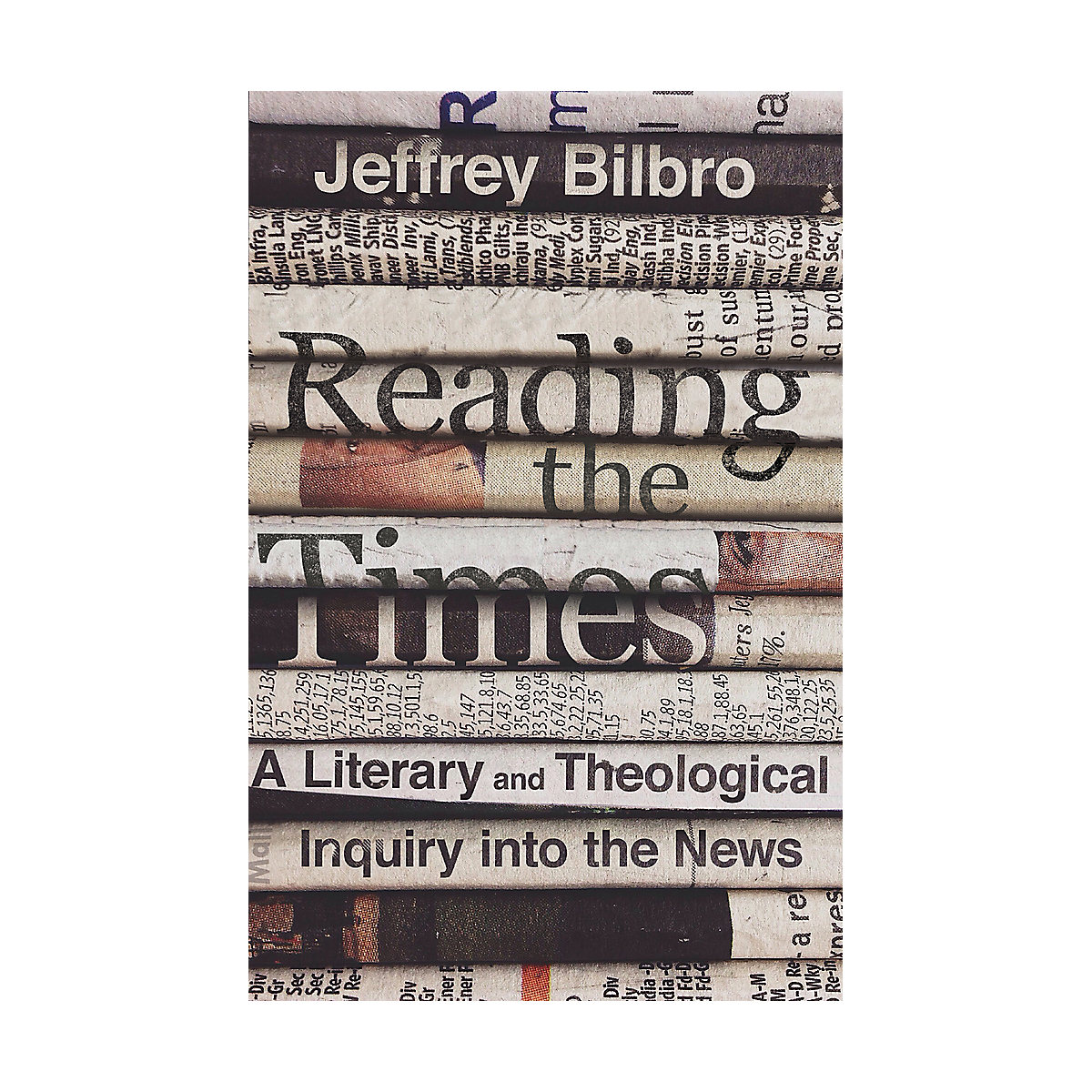Right now, your pocket is probably buzzing with a notification on your phone. Cable news floods our televisions, opining on the latest outrage-inducing event. Even gas pumps now have miniature screens that lure us into buying a mediocre cup of coffee in the convenience store.
Media is everywhere. We can’t escape. Yet we also invite it into our lives. We’re addicted to the noise, and we’re utterly exhausted.
What is this news addiction doing to us? Is there a way out? And, most importantly, how should our Christian faith lead us to think about these questions? Jeffrey Bilbro addresses these questions and more in his timely new book, Reading the Times: A Literary and Theological Inquiry into the News (IVP Academic, 2021)

Summary of Reading the Times
Bilbro begins by posing the problem: The media landscape is frenzied, with thousands of voices clamoring for our attention. How can we cut through the chaos? How can we discern what’s true when cat videos, cable news, cultural commentary and clickbait bombard us every waking hour?
We’re not the first to ask such a question. Bilbro interacts with the best of Christian tradition to help us “think theologically about how Christians should consume the news.” To achieve this goal, he speaks to three important topics — Attention, Time and Community.
Section one attends to our Attention. The abundance and speed of our news can cause a “macademized intellect,” to borrow a phrase from Henry David Thoreau. Such an intellect is characterized by an indigestion from unhealthy news consumption, an increased vulnerability to advertisers and politicians, and warped emotional sensibilities. We care too deeply for problems far from us (which we can’t change) while losing the capacity to address the problems close to home (which we can).
Bilbro advocates what Pascal calls sancta indifferentia, a holy apathy to the frenzied news cycle rooted in a confidence in God and humility about ourselves. Ironically, he argues, caring less about outcomes may make us more faithful witnesses — whether we win or lose. Practically, believers can cultivate better practices for attention by learning a craft and “read[ing] the eternities.” He explains,
What we may need is simply silence, long walks, or even the quiet work of washing the dishes by hand. Netflix isn’t the balm of Gilead.
People are yearning for a narrative to make sense of the world’s events. Christianity provides such a narrative.
Section two addresses Time. Bilbro distinguishes between two notions of time: “kairos,” which is seasonal or rhythmic, and “chronos,” which is linear and sequential. Our culture overvalues the latter, leading us to prioritize the new, assume that time leads to progress and believe in a “right side of history.” In this mindset, news constitutes the “main drama” of our lives; it shapes our sense of meaning and understanding of the world.
Whether through kairos or chronos, people are yearning for a narrative to make sense of the world’s events. Christianity provides such a narrative. Bilbro writes,
The arc of history does not bend toward the Roman eagle or liberal democracy; rather all its events are relative to the crucified and risen Word. And Christians must learn to read the events of chronos in that light.
Christ resides at the center of human history. How can we reorient our lives to this vision of time? Bilbro recommends we follow a liturgical calendar, adjusting our life rhythms to the biblical story, and meditate on art that reflects this vision of history.
Section three speaks to Community. Media and technology have shaped our identity and sense of belonging. We are less rooted to families, places and religious traditions and thus more susceptible to inferior sources of identity — such as the news. Bilbro explains,
Modern news organizations double as lifestyle brands; where we get our news signals and shapes our identity.
Our loneliness can lead us to join pseudocommunities, like the social media mobs Bilbro dubs “atomized swarms.” These groups give a semblance of community and purpose, but they are shallow and ineffective.
We need to build better communities formed around a “shared attention to God.” Bilbro charges us not only to “think well” but also “belong well” to our communities. And we can invest in positive, redemptive media organizations. Practically, we can begin the process of achieving these lofty goals by taking a walk, a simple task that makes us more in tune with our communities. And we can “subscribe aspirationally,” supporting journalism and media that invite us to think deeply and wisely about the events of our day.
Walking functions like a palette cleanser for my media-laden soul.
Wise, Practical and Liberating
Reading the Times is a tremendous, timely book from Jeffrey Bilbro. The problems he highlights pervade our culture. Information daily inundates us, and we grow numb to the effect the news has on our souls. Now, more than ever, we need to know how to read the news and engage in media with wisdom and care. Bilbro’s book is a wonderful starting point. Three main reasons stand out.
First, Reading the Times is wise. Bilbro roots his insights in the broader Christian tradition, interacting with Thoreau, the desert Fathers, Augustine, Pascal, Marilynne Robinson and Frederick Douglass, just to name a few. By marinating in these diverse voices and wise thinkers from across the ages and curating their insights for today’s problems, Bilbro has modeled the kinds of practices he recommends in the book’s pages. Bilbro’s work is the antithesis of the shallow, noisy media that clutters our days.
Second, Reading the Times is practical. Along the way, Bilbro recommends simple, attainable steps to reorient ourselves to more healthy media practices. For example, I can testify to the beauty of a simple walk. Walking functions like a palette cleanser for my media-laden soul. I step away from mundane social media controversies and see the world (and my community) as it really is.
Third, Reading the Times is liberating. We can so easily get invested in a media-induced furor of trying to know about all the world’s problems or grow fearful about the future. But Bilbro urges us to pause, breathe and attend to the things that really matter. We remember that we’re living in God’s grand narrative, and we know he wins. This truth leads us to invest our lives in our communities, not Internet mobs.
When we free ourselves from our media addictions, we and our communities will be healthier. We’ll read the news not with gluttonous appetite or outright disgust, but with a peace that comes from knowing God’s in control.
Bilbro occasionally wades into dense theological and philosophical discussions, so the average lay believer may find some of his chapters more challenging than others. But for those who can follow along with his conversation, Reading the Times may be one of the most important books they read this year.
Editor’s Note: This review is based on an advanced reader’s copy of the book provided by the publisher.




No comments have been added.